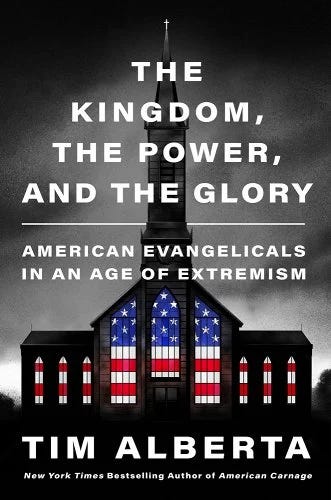Christian Nationalism Isn't the Same as Conservative Christian
Christian Nationalism has become like "woke" on the Right.

For some on the Right, "woke" can be used to encompass many ideas they disagree with. Something similar is happening on the Left with "Christian Nationalist." The term has been used for so many things that progressives don't like, it's in danger of becoming a meaningless buzzword, like woke. In some cases, it's being confused with those who are simply politically conservative Christians.
NYT columnist David French made a similar point in an op-ed shared in last week's newsletter. "It is not Christian nationalism if a person’s political values are shaped by the individual’s Christian faith," he wrote.
A related issue was in the news recently when Politico reporter Heidi Przybyla claimed on a MSNBC segment that Christian Nationalists "believe our rights as Americans and as all human beings do not come from any earthy authority. They don’t come from Congress, from the Supreme Court, they come from God." While it's true that Christian Nationalists believe that, that's not what makes Christian Nationalism distinct from other views. Many people believe that our rights are God-given and it's found in the Declaration of Independence.
Przybyla apologized in a Feb. 29 op-ed, writing, "Due to some clumsy words, I was interpreted by some people as making arguments that are quite different from what I believe."
"To state the obvious, the above is not a good definition of Christian Nationalism. Many people have views about our rights as Americans that would coincide with those of many of our nation’s founders," Przybyla added.
To avoid the same mistake, here are three tips to keep in mind when discussing Christian Nationalism:
1) Remember that what makes Christian Nationalism distinctive is belief in government favoritism for Christianity, and often a particular sect of Christianity.
2) Don't describe Christian Nationalism as extreme patriotism. As I pointed out in my July 4, 2023 op-ed in the Dallas Morning News, Christian Nationalism rejects the core American values of religious tolerance and pluralism. So Christian Nationalism is better described as unpatriotic, or un-American.
3) Avoid describing someone as a Christian Nationalist. Through overuse and abuse of the term, Christian Nationalist has become a pejorative label, so it's not useful for constructive conversations. Some may use the term to describe themselves, but even then, proceed with caution. Most one-on-one conversations about Christian Nationalism these days should probably start with both parties defining the term.
You're Invited to Join the AVC Book Club!
The next book for the AVC Book Club will be Tim Alberta's The Kingdom, the Power, and the Glory: American Evangelicals in an Age of Extremism (affiliate link), and the author will join us for one of the meetings. We meet online Mondays, 8pm eastern. No meeting next Monday but we'll start with the prologue and Chapter 1 on March 18.
Tell Your Pastor!
Do you know a Christian pastor or ministry leader who has experienced political and cultural divisions in their church and community? Are they concerned about increasing polarization in an election year? AVC has a new project especially for them!
J29 Coalition will help pastors and ministry leaders disciple their congregations through our current challenges by connecting them with experts on these topics and putting them in fellowship with other pastors experiencing the same challenges. Our first J29 Cohort starts in April and is limited to 50 pastors. We'll meet online throughout the year and at an expenses paid trip to Chicago in September. To learn more, sign up on our email list and join one of our online informational sessions on March 8 at 11am Eastern, or March 19 at 2pm Eastern.
New Book
I contributed a chapter to a new book, published this month by University of Pennsylvania Press, titled Trump, White Evangelical Christians, and American Politics: Change and Continuity.
You can read a summary and get a code for 30% off on the Religion in Public blog here.
What Else We're Reading
Study: "‘Where there are villains, there will be heroes’: Belief in conspiracy theories as an existential tool to fulfill need for meaning"
Abstract:
What leads people to believe in conspiracy theories? In this paper, we explore the possibility that people might be drawn towards conspiracy theories because believing in them might satisfy certain existential needs and help people find meaning in their life. Through two studies (N = 289 and 287 after exclusion), we found that participants higher in the need and search for meaning were more likely to believe in conspiracy theories. This relationship was not moderated by participants' feelings of control. We also found that believing in conspiracy theories was associated with more presence of meaning (Study 1), and more precisely with a heightened feeling of mattering in the grand scheme of things (Study 2). Additionally, we found that participants were more likely to endorse conspiracy theories that left them more agency and allowed them the possibility to make a difference. Overall, we argue that our results suggest that people might sometimes be drawn towards conspiracy theories because they allow them to feel as if they can make a difference and have a positive impact on the world, and thus that conspiracy theories can be used as tools to satisfy existential needs.
Link.
BBC: "Trump supporters target black voters with faked AI images"
A creator of one of the images told the BBC: "I'm not claiming it's accurate."
The fake images of black Trump supporters, generated by artificial intelligence (AI), are one of the emerging disinformation trends ahead of the US presidential election in November.
Unlike in 2016, when there was evidence of foreign influence campaigns, the AI-generated images found by the BBC appear to have been made and shared by US voters themselves.
One of them was Mark Kaye and his team at a conservative radio show in Florida.
They created an image of Mr Trump smiling with his arms around a group of black women at a party and shared it on Facebook, where Mr Kaye has more than one million followers.
CNN: "Text messages shed new light on scope of fake electors plot after 2020 election"
The texts show that even after the carnage of January 6, Chesebro continued pitching ideas to Troupis for how the election could be overturned through long-shot lawsuits.
According to the text chain, he told Troupis on January 8, 2021, “The events of the last 2 days open up legal options in the states for winning rulings favorable to Trump.”








